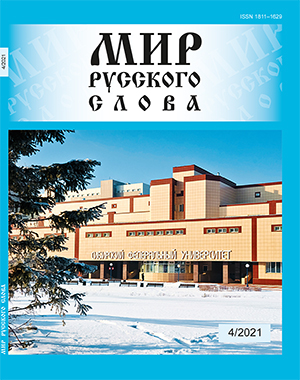Evaluative Adverbs as a Means of Anomaly Expressing
DOI:
https://doi.org/10.24412/1811-1629-2021-4-31-37Abstract
The article examines the role of evaluative adverbs in the formation of the semantics of deviation from the norm. Such well-known researchers as E. M. Wolf, Yu. D. Apresyan and N. D. Arutyunova define norm and anomaly by opposing them as linguo-axiological categories. It is known that the norm is rather poorly represented in the language, in contrast to its antinomy. Violations of the usual course of events, something unusual and not fitting into a standard framework arouses more interest among native speakers and, accordingly, is discussed more often. Although category of assessment is well researched in many scholarly works in various areas of linguistics, including cultural linguistics, the theory of functional grammar, cognitive linguistics and others, the opposition ‘norm vs. anomaly’ remains poorly described. The relevance of this article, therefore, lies in the need for a more complete study of the means of expressing norms and anomalies in the Russian language. The author conceptualizes different approaches to the definition of the anomaly, paying particular attention to the specific means of expressing the anomaly at the lexical level, analyzes relations between the categories of assessment and intensity, as well as the ways of forming the seme of anomaly in the structure of adverbs’ lexical meaning. The specificity of intensifier adverbs’ expression, such as “overly”, “excessively”, “too much” is determined using examples of idioms and quotations from fictional texts, and the patterns of these adverbs’ lexical compatibility are also revealed in the article, as well as the expressive-evaluative possibilities of phraseological units. Presented results may contribute to the theory of the linguistic category of value.
Keywords:
evaluation category, intensity, evaluative adverbs, norm, anomaly, semantics, phraseology
Downloads
References
Литература
Sources
References
Downloads
Published
How to Cite
Issue
Section
License
Articles of "The World of Russian Word" are open access distributed under the terms of the License Agreement with Saint Petersburg State University, which permits to the authors unrestricted distribution and self-archiving free of charge.




